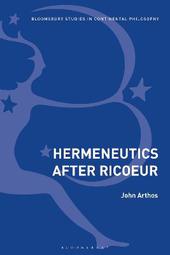
|
Hermeneutics After Ricoeur
Hardback
Main Details
Description
There has been a renaissance of interest in the work and thought of Paul Ricoeur, one of the great hermeneutic scholars of the twentieth century. It is time to assess the future landscape for hermeneutics as a scholarly field and an educational curriculum after the momentous impact of Paul Ricoeur, who extended and deepened its trans-disciplinary reach, and pushed its profile substantially beyond its German legacy. There exists a misunderstanding that his thought is simply an extension or revision of Heidegger and Gadamer; Hermeneutics After Ricoeur ably sets out the differences and tensions, establishing the originality of Ricoeur's thought and its application beyond hermeneutic studies, with a thematic focus on education, the humanities, and the liberal arts.
Author Biography
John Arthos is Associate Professor in the Department of English at Indiana University, USA and a board member of the Society for Ricoeur Studies in the United States.
ReviewsAn excellent analysis and reflection on the significance of Ricoeur's thought from one of the premier scholars in hermeneutics. The book offers a fine balance of breadth, depth, and spaciousness of thought in dealing with key debates in the history of philosophy and how Ricoeur's contributions matter greatly. -- Todd Mei, Senior Lecturer in Philosophy, University of Kent, UK and President of the Society for Ricoeur Studies Hermeneutics After Ricoeur is a superb book. It is a passionate defense of the project of a general hermeneutics, and shows that despite his own reservations, Ricoeur has much to contribute to this project. Arthos balances sensitive readings of Ricoeur's key works with a panoramic view of his place in the larger intellectual currents of his time. Above all, he shows that Ricoeur is a valuable ally to those concerned about the future of the liberal arts. An indispensable work. * Robert Piercey, Professor of Philosophy, University of Regina, Canada * John Arthos is perhaps uniquely gifted to write this book. The book evinces his singularly deep and erudite immersion in the hermeneutics not only of Ricoeur but of Gadamer and Heidegger, and the result is a sophisticated, interwoven argument for a general hermeneutics after Ricoeur. The model of hermeneutics that the book proposes - one of dialogue and contestation - is one that the book undertakes itself in analysis of Ricoeur. Of particularly timely interest in the absolutism of our times is the book's advance of a political hermeneutics building on Ricoeur that seeks recognition of our situated finitude and calls for prudential dialogue and judgment. * George H. Taylor, Professor of Law, University of Pittsburgh, USA * John Arthos is one of the few scholars who can offer such a comprehensive, lucid, and engaging study of Ricoeur's legacy in hermeneutics. Part intellectual history, part close reading of complex concepts, and part panoramic surveying of Ricoeur's rich body of works, Arthos's book is not only an outstanding contribution to hermeneutics, but also an original type of scholarly monograph, a real exercise in humanistic method, blending inquiry with historical narrative, and critique with application. * Andreea Deciu Ritivoi, Professor of English, Carnegie Mellon University, USA *
|